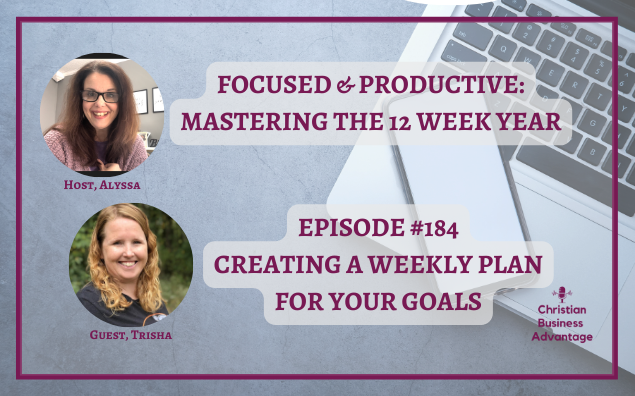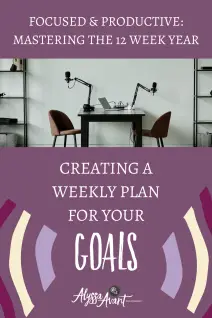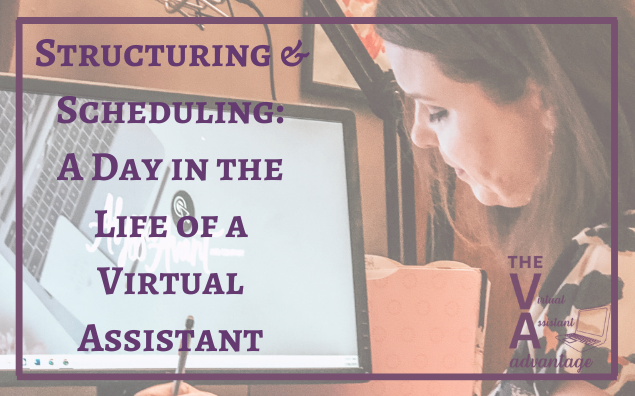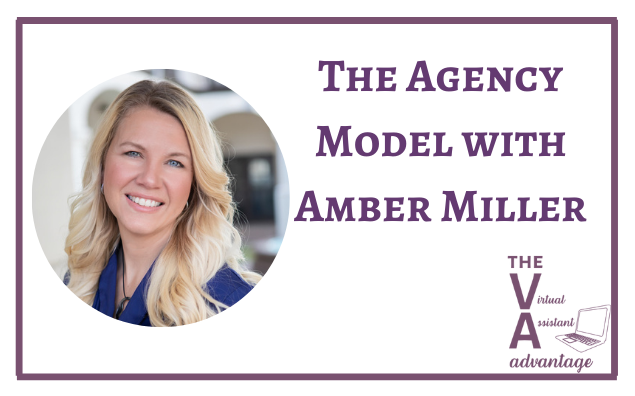Creating a Weekly Plan For Your Goals
My friend and accountability partner, Trisha and I are continuing our discussion on implementing The 12 Week Year method based on the book by Brian P. Moran so we can achieve both personal and business goals. If you missed the previous episode when we introduced the concept of The 12 Week Year and how we use it for goal setting, revisit the blog post here to listen!
In this episode, we share with you how we create an effective weekly plan and how we track our tasks to discover what our score is for the week and note the progress we’ve made. Ultimately, we see how we’re utilizing The 12 Week Year concepts that we learned through Brian P. Moran’s book to help us achieve the goals that we set, stay motivated and keep ourselves accountable!

Remember, it’s not just setting your goals, but creating a plan. You do that by having weekly and daily tasks. I’m going to let Trisha share with you how she does it first, and then I’ll tell you how I do it as well.
Two Approaches to Creating a Plan
Trisha: The main key is, as long as it’s in front of you where you can see it every day, you will take action! You can make it work best for you.
For me, I have a file in my Google drive and I adjust each quarter. I put at the top the daily tasks that I want to do, like you said, reading for 15 minutes or reading my Bible, and then I put the little check boxes cause it’s always fun to check things off. Then down a little, I have my weekly or sometimes monthly tasks you just need to do.
It’s a one time thing. So I put those down a little further and put the number of boxes that I need next to those.
I keep that on my desk in a little rack that I’ve had for years where I keep my client information. It’s in the very front of that so I can see it every day. I can see the progress I’m making, or where I may be not making progress if it’s a crazy week.
Alyssa: So you do it in Google, but then you print out a piece of paper that you can physically check off?
Trisha: Correct. That is correct.
Alyssa: I’m such a paper and pen girl still, even though I work mostly digitally and virtually, but what I do is very similar.
I use a planner. I’ve been using a Passion planner for probably about six years. I write down on the planner in a specific place, my daily stuff, which is for me. I like to keep up with my budget daily and make sure I’m not spending too much. I read and do my quiet time every day.
Then I have some weekly things that I do for my business, and those are on there as well.
The Concept of Tracking
Alyssa: One of the things that The 12 Week Year teaches is the concept of not just having these activities and these plans, but also the concept of tracking.
It says in The 12 Week Year the importance of tracking what you’re doing. We get to give ourselves a score and you can actually get a weekly score card. I think you can download it from their website that helps you stay accountable and make adjustments.
Literally I have those tasks on my little list and at the end of the week, I count how many tasks there are. So for the daily, there’s five for each of those areas. I count how many things I have actually accomplished. You have to do a little math to determine your score.
Scoring the Tasks
Alyssa: For The 12 Week Year, 85 percent is considered a good score. You don’t have to be a hundred percent every week, but it motivates you. There’s something about that score for me that is motivating. Last week was week one in our current 12 weeks. And I made a 91 and was super excited.
Now, if I go back in my planner to May on week seven, I made a 63. 6%. I was on the struggle bus back in May. I had kids finishing up a school year.
Are you similar to me on how you do your tracking?
Trisha: I do the exact same thing. I just tally up the number of boxes, like you said, divided by how many there were total, and that’s how you get your score. Now I had an abnormal week this week. I was out of the office part of yesterday and all of the day before.
I can look and be like, oh man, I have a couple more things to do. And you and I will do this a lot. We’ll see our Saturday’s kind of light this week. So I’m going to go ahead and try to push a little on Saturday.
It helps in that way too because you see where you are for the week, and push if you have an evening off at home. Read your book at home, which you normally would have done during the day, but you didn’t get to. But yeah, as far as adding up the scores, I do mine exactly the same way.
Alyssa: Awesome.
The tracking and scoring for me is huge because that helps me stay motivated. I’m a very tactile person and I like to check the boxes off. I write a to do list every single day. That’s one thing I want to point out. This is different from your daily to do list – this is stuff that you have goals to work on.
Otherwise you might ignore if you were just going about your daily to dos because on my daily to do list, I still have client work every single day. The client work that I do is not counted in this. Instead this is completely goal oriented projects and tasks that helped me to meet those goals.
So it’s not our daily business work. Would you say that’s the case for you as well?
Trisha: It’s more like working in your business. Sometimes when you get busy with client work, you neglect working in your business and this kind of helps you to work in your business.
These small steps along the way make a big impact at the end.
If you just keep doing it. And like you said, some weeks you are going to have a 60; like life happens and it is okay. Now this week I’m trying to beat that score.
You’re not going to get a hundred every week, but if you make 85 percent every week, that’s huge progress towards your goal.
Alyssa: And it makes you feel good!
Next week, Trisha and I dive into the relationship that we have as accountability partners. We’ll share what to look for in an accountability partner and how having one will help you to be focused, stay on track and achieve your goals.
Questions? Join the Group!
If you have specific questions about hosting a virtual summit, I’d love to get those because that would help me to make sure that I’m covering everything that you’re interested in knowing during this series on the podcast. You can submit your questions inside The Christian Business Advantage Facebook group. I look forward to seeing you there!








One Comment